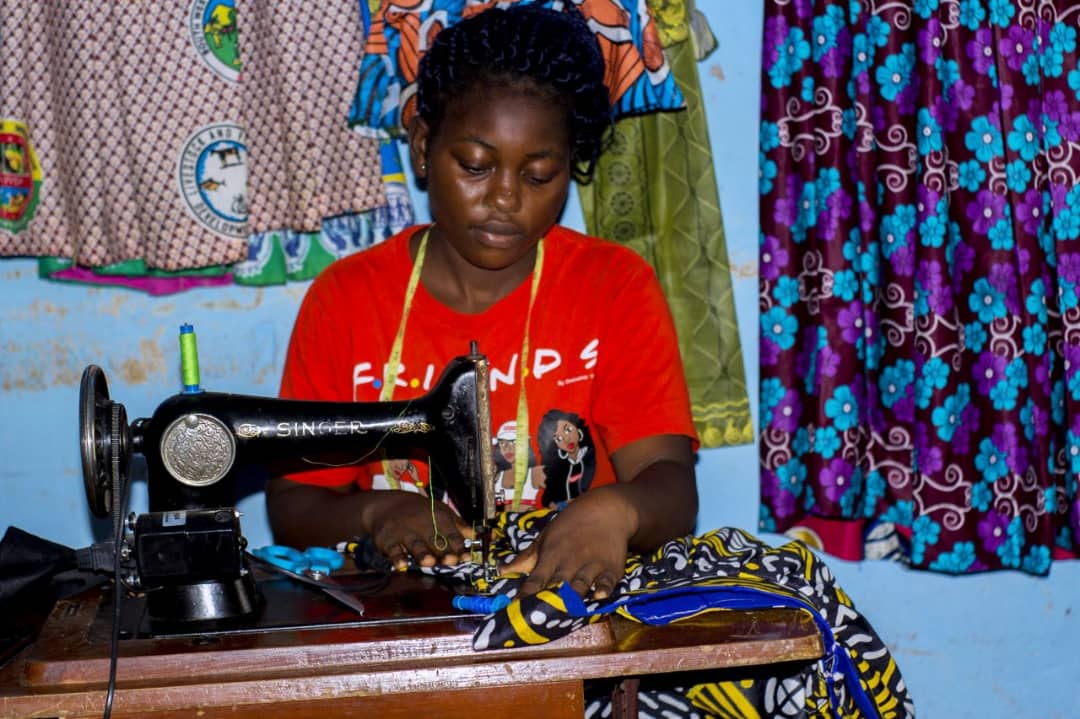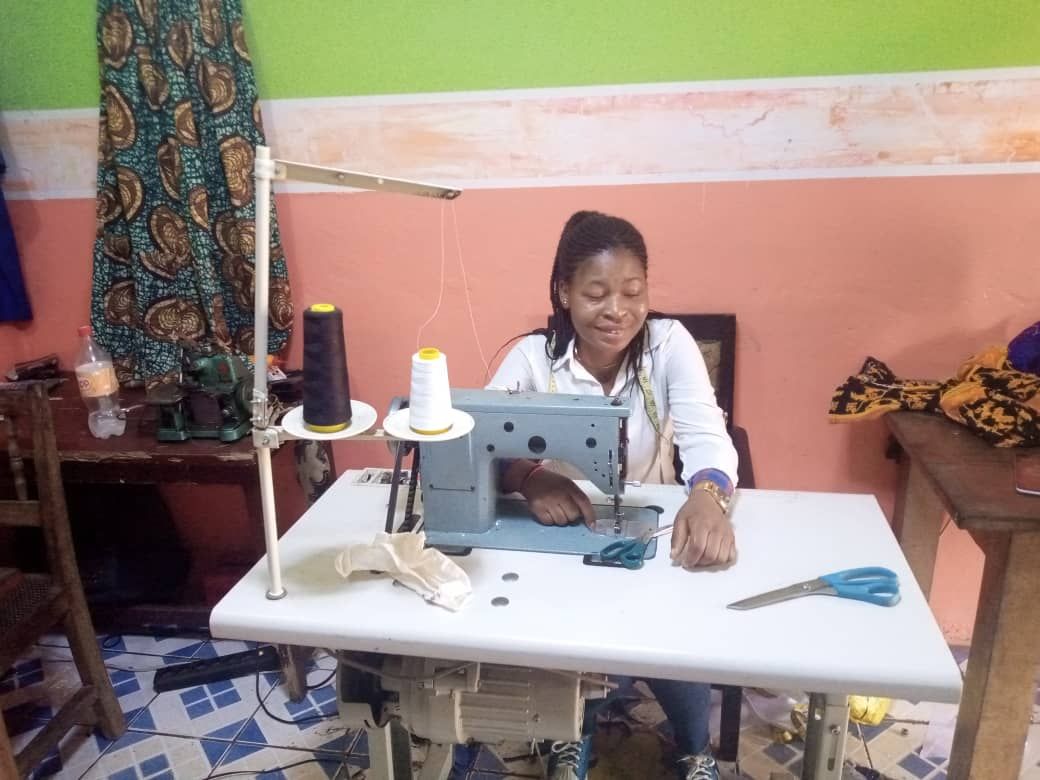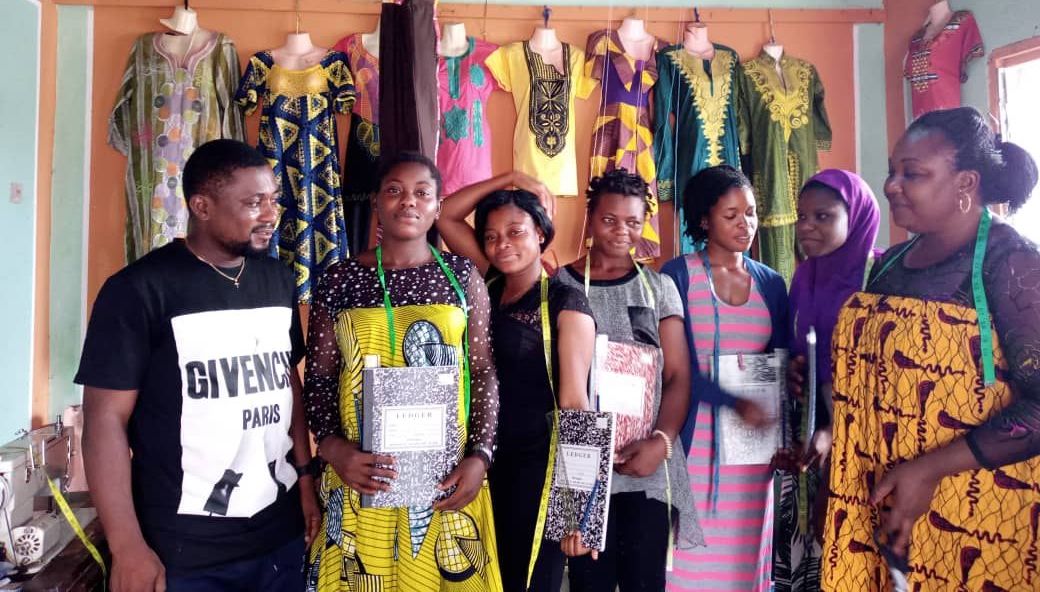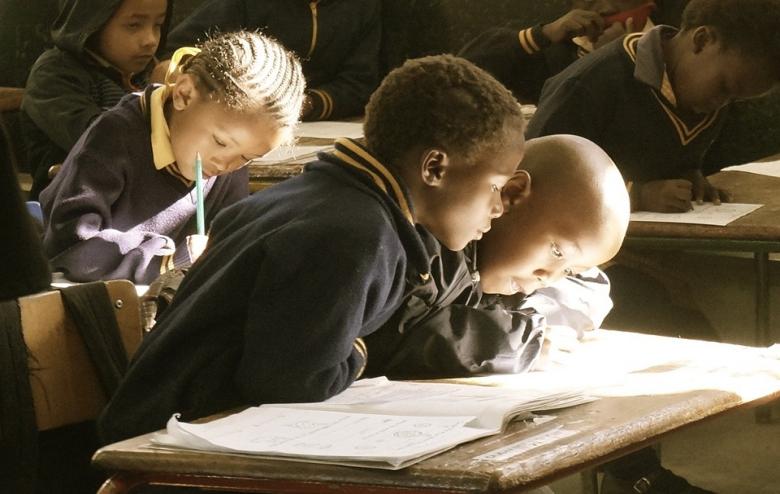WOMEN & GIRLS ECONOMIC EMPOWERMENT PROGRAM
Women & Girls Economic Empowerment Program
Opening up economic opportunities for women and girls in rural and underserved communities in Cameroon is the core of our work.
‘We believe all girls and women can embrace who they are, can define their future, and can change the world.’
Girls and women make up most of the world’s 628 million unemployed young people who have neither education nor vocational training. Barriers caused by gender inequality and discrimination are preventing girls from going to school and getting the skills they need to access decent work and break out of poverty. This is unjust and at the same time a huge waste of potential. In Cameroon, it is not just the result of gender inequality and discrimination, but also lack the financial means to pursue an education.
“If they cannot afford to eat, they cannot afford an education because one does not learn with an empty stomach” – Bertin Milat
The already deteriorating socio-economic conditions of women and girls in the North and South West regions of Cameroon where we work has been made worse by the ongoing Anglophone crisis that has displaced thousands of women and girls including accompanying children and other family members who currently laments in poverty in places far from where they could call home.
Here you can see what the Milat Foundation is doing to help and our strategic approach to taking women, girls, children, and their families out of poverty.
VOCATIONAL SKILLS TRAINING PROJECT
‘Empowering A Woman Is Empowering A Nation’
Our Vocational Skills Training Project’ is the first phase of our organisation’s Women and Girls Economic Empowerment & Employment Initiative. Because empowering a woman is empowering a generation, we support women and out-of-school girls and help them maximise their full potential through vocational skills training opportunities.
Vocational trainings with focus on employment – This initiative is based on a solid foundation of tried-and-tested methods of economic empowerment.
The main objective of this initiative is to cut poverty and boost opportunity by empowering out-of-school girls and single mothers struggling to raise and give their children a better future despite the downsides of living in extreme poverty.
This is one of our progressive anti-poverty initiatives with a focus on boosting participants’ confidence and making them become productive members of their communities. Beneficiaries are especially from the least privileged backgrounds, living in abject poverty and lack the financial means to either pursue formal education or set up for themselves a life-sustaining economic activity.
The training provides skills and competencies directed towards specific trade and job functions and prepares participants to later take up life-sustaining economic activity, become self-reliant and empowered. Graduates are packed with the skills needed for them to run their own businesses and earn a living for themselves, their children, families and become productive members of their communities.
In partnership with established training centres and/or established businesses, we currently offer the following vocational training opportunities from which beneficiaries choose based on their interest, pre-existing skills if any, and most importantly what they are passionate about:
- Sewing and Dress Making
- Hair Dressing and Beauty
- Computer and Documentation Services
- Catering and Hotel Management
We’re planning on introducing new trades base on market analysis and also the interest of potential beneficiaries of this program. Our goal is to introduce trades that has the potential of securing livelihood for women and girls upon completion of their training.
Training programs often last between 6 months and 2 years depending on the trade selected. By the end of the training, participants must have gained enough support in creating and accessing opportunities for employment and income generation, knowledge and skills transfer, and community capacity building. To implement this program, we partner with selected vocational training centres and established businesses in the communities we serve. Our skills instructors are not only experts in their field, but they also have full knowledge of the industry or business they are involved in.
Our Approach
Project Coordinators follow the training achievements of the trainees. We have developed a multi-step approach to monitor and evaluate their training progress and learn in the process:
- Our staff (project coordinators) visit the training centres periodically
- The trainers also act as advisors and support us in mentoring, monitoring and evaluating the trainees
- Trainees will submit periodic written reports to share their reflections and highlight issues they encounter as the training unfolds
- Trainees who are unable to submit a written report (due to language or educational limitations) will be interviewed in their preferred means of communication (language or dialect), and have their report documented by our project coordinators.
Selection Criteria
Our vocational skills training beneficiries fall under one or more of the following categories:
- Women especially single mothers struggling to raise and give their children a better future despite the downsides of living in poverty
- Out-of-school girls who lacked funding to pursue formal education or set up a life-sustaining economic activity
- Internally Displaced Persons (IDP women & girls)
- Vulnerable women and girls, school drop outs and street children identified as needing help
All categories must show a genuine desire to pursue vocational skills training in a selected trade and demonstrate good moral and ethical behaviour.
POVERTY TO PROSPERITY (P2P) PROJECT
‘We don’t just train them and send them back into poverty. We assist them materially and financially in setting up an income generating activity – their own small business. We also give them access to business and financial management training to ensure a smooth running of their businesses.’
The Poverty to Prosperity P2P Project set up an income generating activity – small business or workshop – for the women and girls that have successfully graduated from the Vocational Skills Training Project. We envisage this approach as highly accomplishing as it is important that we take these women and girls off the streets of war in the North and South West Regions of Cameroon, and thus out of the poverty trap. This gives them a reason to smile as it enables them to live a dignified life where they can be able to earn a living from profits gotten from their businesses and be able to help themselves, their children, their families, and become productive members of their communities.
VOCATIONAL TRAINING – Training Period: 2019 – 2021
North West Region of Cameroon
Shisong, Kumbo – Bui Division
Babessi, Ndop – Ngo-ketunjia
Kikaikom, Kumbo – Bui Division
Kom, Kumbo – Bui Division
Njinikom – Boyo Division
South West Region of Cameroon
Muea, South West Region
Molyko, South West Region
Limbe, South West Region
Tiko, South West Region
Trades chosen by current trainees:
- Sewing and Dress Making
- Hairdressing and Beauty
- Computer & Documentation Services


Follow us, every step of the way.
2019 Vocational Training for Out-of-School Girls and Single Mothers – now open for registration
Through our Poverty to Prosperity (P2P) Project, we offer vocational training to out-of-school (underprivileged) girls and single mothers struggling to raise and give their child/children a better future. Objective of the Project: The main objective of this project is...
Volunteers Needed for our ‘Access to Early Childhood Education’ Survey
The Milat Foundation is accepting volunteer applications for its ‘Access to Early Childhood Education’ survey that will inform its needs assessment analysis to be able to give the gift of education to kids without access to primary education. Objective of the Survey:...
The Darrell Milat Scholarship for Child Health & Well-being, Justice & Child Protection
The Milat Foundation the Darrell Milat Scholarship announces a number of scholarship positions for the academic year 2019/2020 in the following subjects/focus areas: 1. Law: Support the training of students pursuing a law degree with a strong interest in Justice,...











